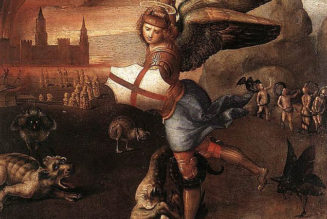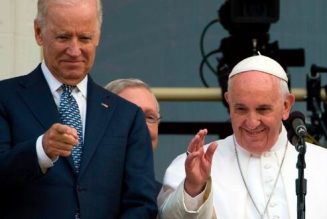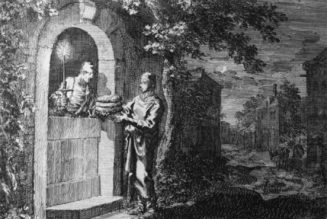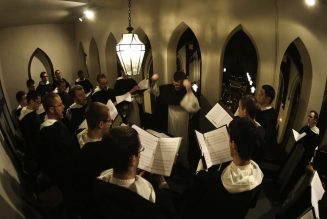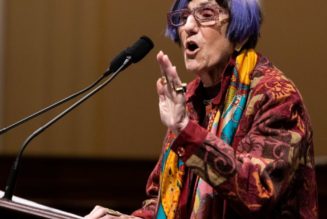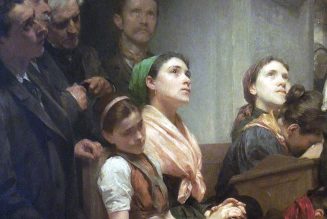, May 21, 2020
 As the world starts to return — ever so slowly, step by step — toward normalcy, Catholics have an enormous opportunity to help people cope with the new world we live in.
As the world starts to return — ever so slowly, step by step — toward normalcy, Catholics have an enormous opportunity to help people cope with the new world we live in.
This Sunday’s Gospel — whether it’s the Seventh Sunday of Easter for you (in the ecclesial provinces of Boston, Hartford, New York, Newark, Philadelphia, or Omaha) or Ascension Sunday (everywhere else) — gives great direction about what comes next.
The way Jesus left was a lesson in what to do in his absence.
In the first reading for the Ascension, before he leaves them Jesus “enjoined them not to depart from Jerusalem,” but to wait and pray for “the promise of the Father,” assuring them “in a few days you will be baptized with the Holy Spirit.”
“You will receive power when the Holy Spirit comes upon you, and you will be my witnesses in Jerusalem, throughout Judea and Samaria, and to the ends of the earth,” he says.
Then, in the Ascension Gospel, Jesus meets his apostles on a mountaintop where, “they worshiped, but they doubted.”
So what does he do? First, he tells them “All authority in heaven and on earth has been given to me.” Then, he commands them to “make disciples of all nations, baptizing them in the name of the Father, and of the Son, and of the Holy Spirit, teaching them to observe all that I have commanded you.”
After that, he leaves them.
In 2020, we find ourselves in very much the situation he leaves the Apostles in.
When “He was lifted up, and a cloud took him from their sight” they stand there, dumbfounded — suddenly alone and uncertain. Two figures ask, “why are you looking at the sky? This Jesus who has been taken up from you into heaven will return in the same way.”
We have spent months without the sacraments, months where Jesus Christ was denied to us. We felt his absence more than ever, and we longed for him like never before. Now, as the world starts to open back up, many of us are looking out into the distance, lost and afraid and maybe even angry.
God does not want us to stand looking at the sky, contemplating our own hurts and confusion. He wants us to pray for the Holy Spirit, so that, when the sacraments return, we will get busy pointing others to the one answer to their loss, anger, pain, and longing.
The first step is to pray.
This is what we see the disciples doing in the readings for the Seventh Sunday of Easter.
“After Jesus had been taken up to heaven, the apostles returned to Jerusalem,” says Acts, and “devoted themselves with one accord to prayer, together with some women, and Mary the mother of Jesus, and his brothers.”
There they must have contemplated his Last Supper Discourse, where he told them that he was to be the center of their lives, but that he would leave them.
“Now this is eternal life, that they should know you, the only true God, and the one whom you sent, Jesus Christ,” he prays in the Gospel for the Seventh Sunday. “I will no longer be in the world, but they are in the world, while I am coming to you.”
This prayer centered on the absent Jesus is necessary for them to embrace the Holy Spirit.
“Why did the Holy Spirit not come to them while Christ was present, rather than after his departure?” asks St. John Chrysostom. Because, he answers, “It was necessary for them to have a longing for the event, and so receive the grace.”
“Our desire toward God is most awakened when we stand in need,” he adds. “If Christ had then departed when the Spirit had already come, and the Spirit remained, the consolation would not have been so great as it was.”
Our longing is meant to lead to prayer, our prayer is meant to lead to faith, and our faith should welcome the Holy Spirit, who compels us to share what we have found.
“The Christian feels compelled to speak to others about the law of love, and the joy of obeying this law,” says St. John Chrysostom. “Those who are not shy will surely want to express their joy at every opportunity.”
Thus, for Christians who follow Christ’s instructions, the pandemic should lead to a new eruption of evangelization.
Take a lesson from actor John Krasinski’s “Some Good News” YouTube show. The show has become immensely popular by sharing some of the best in human beings’ loving responses to the pandemic.
Christians have the ultimate Good News; God’s loving response to our predicament. We even have ways to make sense of pain and death. But too often we spend our time not cheering up the world but casting fear and doubt.
As the Letter to the Ephesians puts it, we alone know that Jesus is at God’s “right hand in the heavens, far above every principality, authority, power, and dominion, and every name that is named not only in this age but also in the one to come.” We alone know that participation in the Church, his body, gives us “the fullness of the one who fills all things in every way.”
Curtis Martin, who founded the Fellowship of Catholic University Students (FOCUS), says he hears lot of excuses for why people don’t evangelize — that they lack training, for instance. “But I never hear people say they don’t tell others about their favorite restaurant because they lack training. When it comes to Evangelization, the difficulty isn’t in the end, it’s the first step.”
So, on this Sunday when we hear the Great Commission, remember the first step.
Pray for openness to the Holy Spirit. There is evidence that fresh air and sunlight are some of the best disinfectants for the coronavirus. They are the best disinfectants for our souls, as well.
Preparing for the Holy Spirit means opening up the dark, hidden places of our heart to the healing rays of God. If we have been seething with rage at one institution or another, we need to let that go. If we have failed to increase our prayer, it is not too late to start.
Lent and Easter gives us a great time to start again. So do weeks-long lockdowns that end around Pentecost, when we will welcome the Holy Spirit into our lives afresh.
After that, it is our job to be Christ’s witnesses to the ends of the earth — starting in our own families and neighborhoods.
Tags: Ascension Sunday Year A, prayer, Seventh Sunday of Easter YEar A, Sunday Gospel, Sunday Readings
Never miss a post! Subscribe below to our weekly newsletter.

